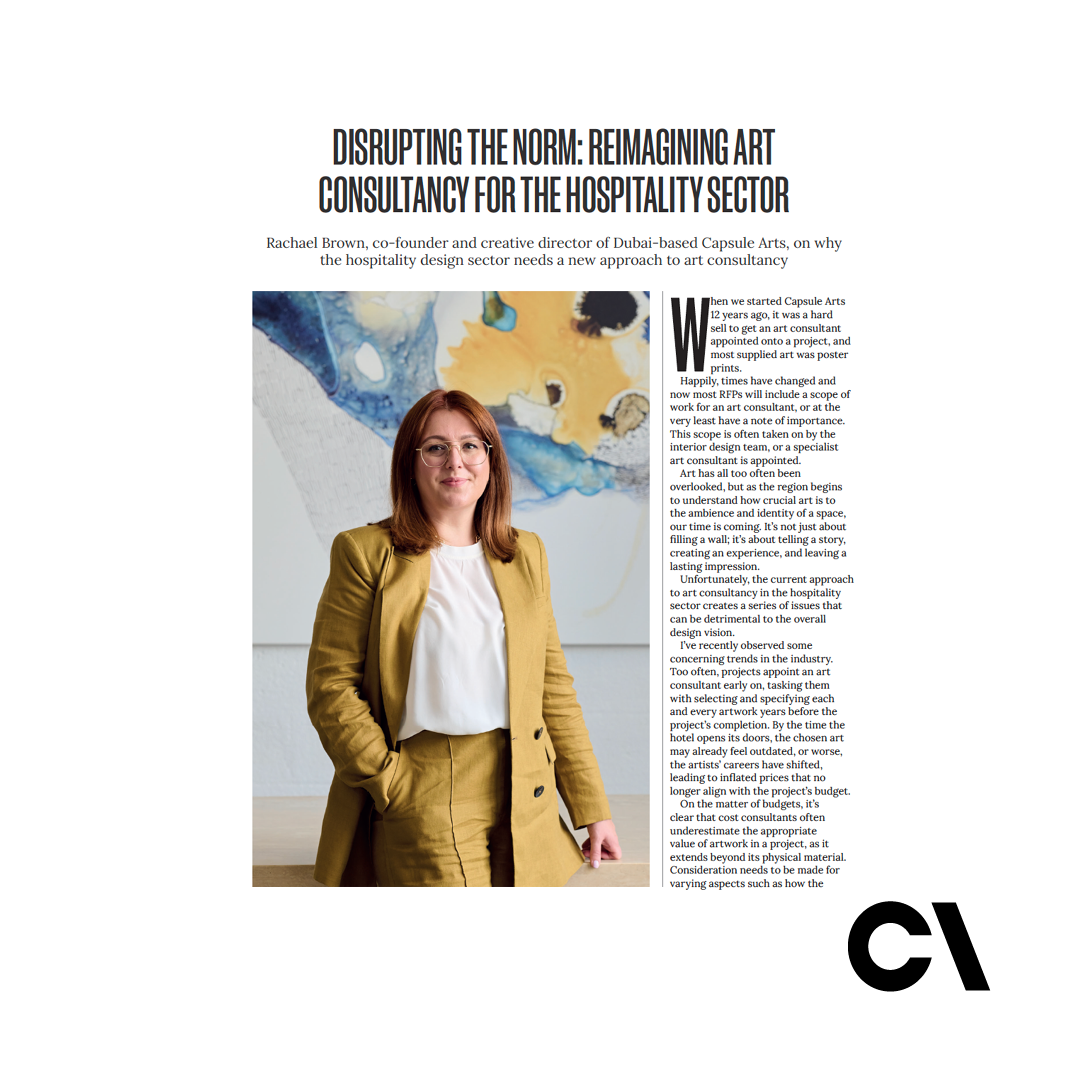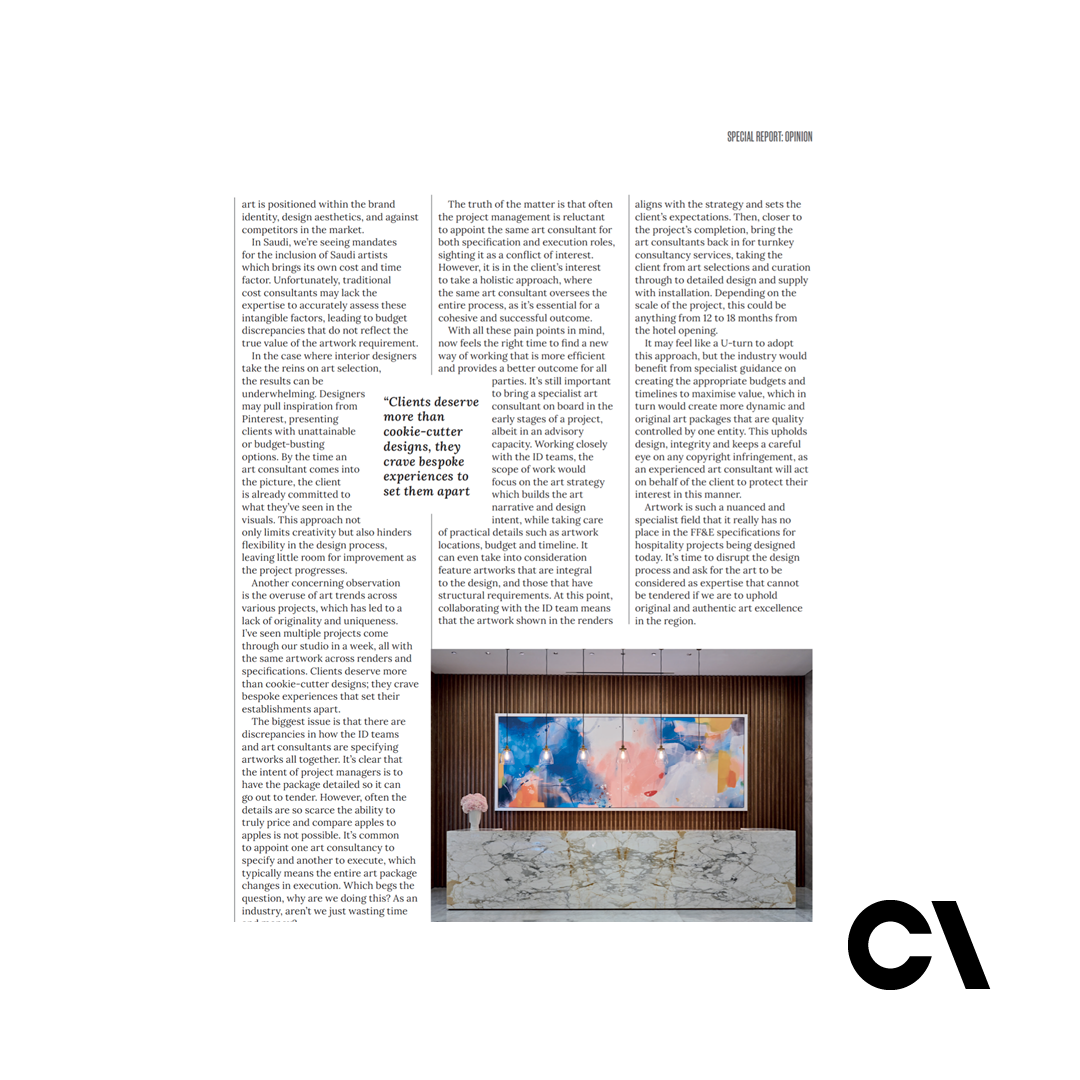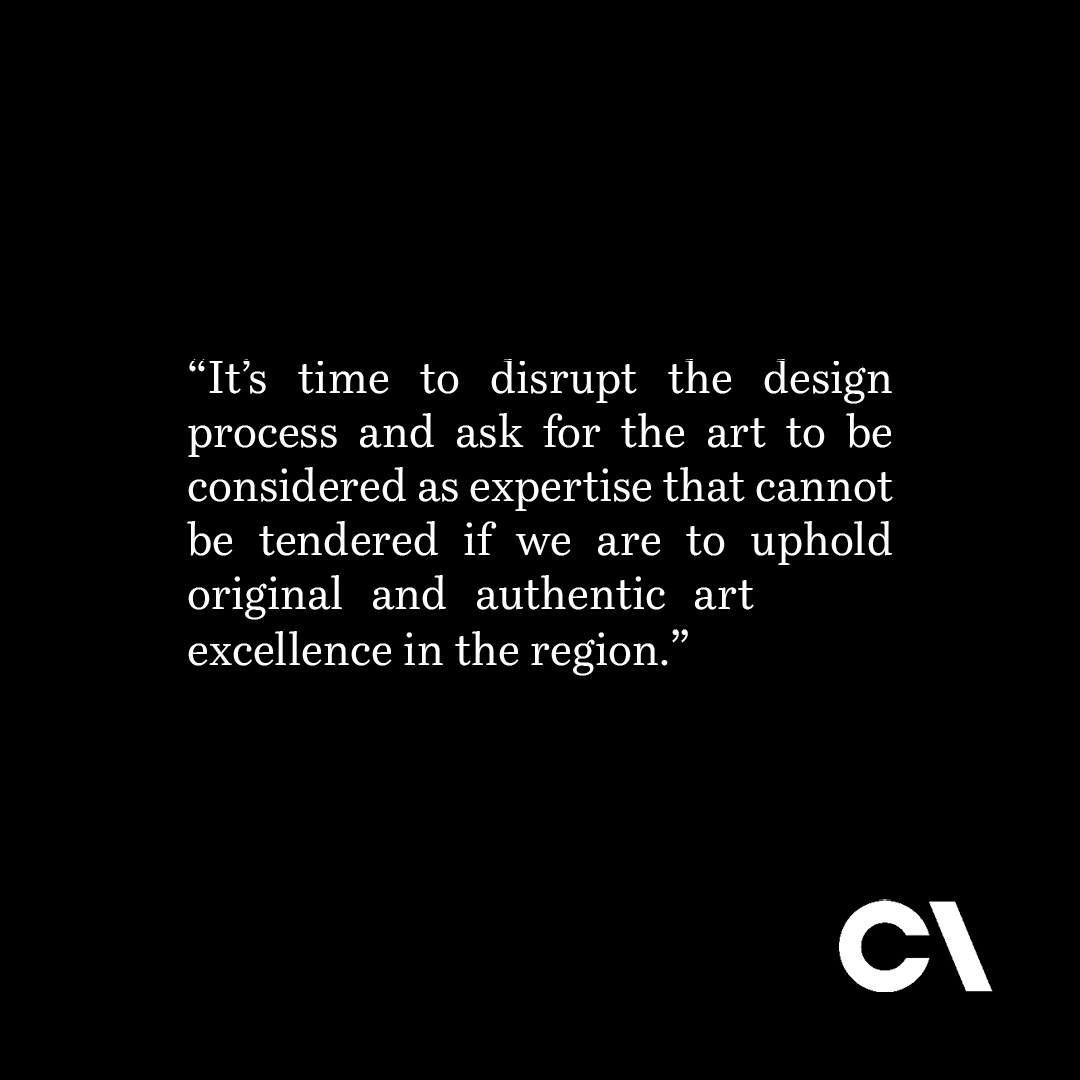Disrupting the Norm: Reimagining Art Consultancy for the Hospitality Sector
Rachael Brown, our Co-founder and CEO is an active advocate for promoting authentic and original art. In the March issue of Commercial Interior Design she shares her opinion on why a fresh approach to art consultancy within the hospitality design sector is needed.
When we started Capsule Arts 12 years ago, it was a hard sell to get an art consultant appointed onto a project, and most supplied art was poster prints. Happily, times have changed and now most RFPs will include a scope of work for an art consultant, or at the very least have a note of importance. This scope is often taken on by the interior design team, or a specialist art consultant is appointed.
Art has all too often been overlooked, but as the region begins to understand how crucial art is to the ambience and identity of a space, our time is coming. It’s not just about filling a wall; it’s about telling a story, creating an experience, and leaving a lasting impression.
Unfortunately, the current approach to art consultancy in the hospitality sector creates a series of issues that can be detrimental to the overall design vision. I’ve recently observed some concerning trends in the industry. Too often, projects appoint an art consultant early on, tasking them with selecting and specifying each and every artwork years before the project’s completion. By the time the hotel opens its doors, the chosen art may already feel outdated, or worse, the artists’ careers have shifted, leading to inflated prices that no longer align with the project’s budget.
On the matter of budgets, it’s clear that cost consultants often underestimate the appropriate value of artwork in a project, as it extends beyond its physical material. Consideration needs to be made for varying aspects such as how the art is positioned within the brand identity, design aesthetics, and against competitors in the market. In Saudi, we’re seeing mandates for the inclusion of Saudi artists which brings its own cost and time factor. Unfortunately, traditional cost consultants may lack the expertise to accurately assess these intangible factors, leading to budget discrepancies that do not reflect the true value of the artwork requirement.
In the case where interior designers take the reins on art selection, the results can be underwhelming. Designers may pull inspiration from Pinterest, presenting clients with unattainable or budget-busting options. By the time an art consultant comes into the picture, the client is already committed to what they’ve seen in the visuals. This approach not only limits creativity but also hinders flexibility in the design process, leaving little room for improvement as the project progresses.
Another concerning observation is the overuse of art trends across various projects, which has led to a lack of originality and uniqueness. I’ve seen multiple projects come through our studio in a week, all with the same artwork across renders and specifications. Clients deserve more than cookie-cutter designs; they crave bespoke experiences that set their establishments apart.
The biggest issue is that there are discrepancies in how the ID teams and art consultants are specifying artworks all together. It’s clear that the intent of project managers is to have the package detailed so it can go out to tender. However, often the details are so scarce the ability to truly price and compare apples to apples is not possible. It’s common to appoint one art consultancy to specify and another to execute, which typically means the entire art package changes in execution. Which begs the question, why are we doing this? As an industry, aren’t we just wasting time and money?
The truth of the matter is that often the project management is reluctant to appoint the same art consultant for both specification and execution roles, sighting it as a conflict of interest. However, it is in the client’s interest to take a holistic approach, where the same art consultant oversees the entire process, as it’s essential for a cohesive and successful outcome.
With all these pain points in mind, now feels the right time to find a new way of working that is more efficient and provides a better outcome for all parties. It’s still important to bring a specialist art consultant on board in the early stages of a project, albeit in an advisory capacity. Working closely with the ID teams, the scope of work would focus on the art strategy which builds the art narrative and design intent, while taking care of practical details such as artwork locations, budget and timeline. It can even take into consideration feature artworks that are integral to the design, and those that have structural requirements. At this point, collaborating with the ID team means that the artwork shown in the renders aligns with the strategy and sets the client’s expectations. Then, closer to the project’s completion, bring the art consultants back in for turnkey consultancy services, taking the client from art selections and curation through to detailed design and supply with installation. Depending on the scale of the project, this could be anything from 12 to 18 months from the hotel opening.
It may feel like a U-turn to adopt this approach, but the industry would benefit from specialist guidance on creating the appropriate budgets and timelines to maximise value, which in turn would create more dynamic and original art packages that are quality controlled by one entity. This upholds design, integrity and keeps a careful eye on any copyright infringement, as an experienced art consultant will act on behalf of the client to protect their interest in this manner.
Artwork is such a nuanced and specialist field that it really has no place in the FF&E specifications for hospitality projects being designed today. It’s time to disrupt the design process and ask for the art to be considered as expertise that cannot be tendered if we are to uphold original and authentic art excellence in the region.




